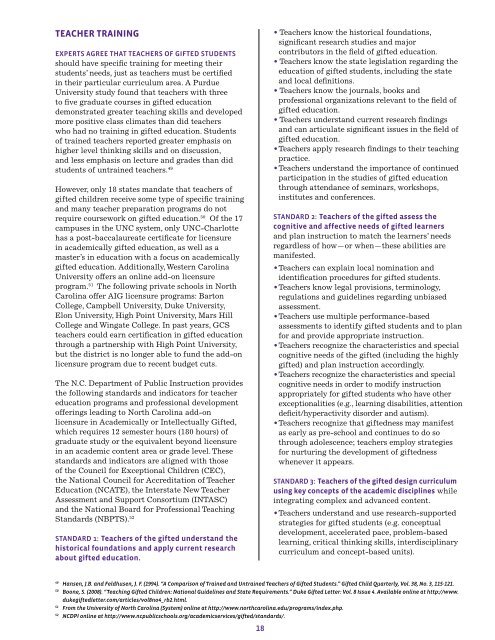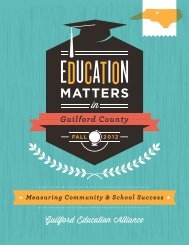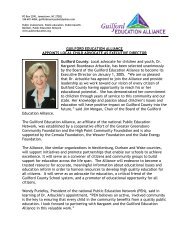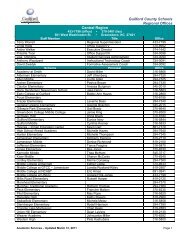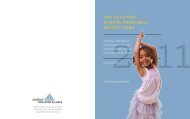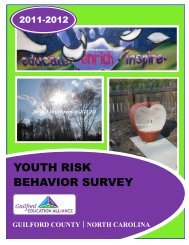2009 Advancing Excellence: A Report on Gifted Education - Guilford ...
2009 Advancing Excellence: A Report on Gifted Education - Guilford ...
2009 Advancing Excellence: A Report on Gifted Education - Guilford ...
Create successful ePaper yourself
Turn your PDF publications into a flip-book with our unique Google optimized e-Paper software.
Teacher Training<br />
Experts agree that teachers of gifted students<br />
should have specific training for meeting their<br />
students’ needs, just as teachers must be certified<br />
in their particular curriculum area. A Purdue<br />
University study found that teachers with three<br />
to five graduate courses in gifted educati<strong>on</strong><br />
dem<strong>on</strong>strated greater teaching skills and developed<br />
more positive class climates than did teachers<br />
who had no training in gifted educati<strong>on</strong>. Students<br />
of trained teachers reported greater emphasis <strong>on</strong><br />
higher level thinking skills and <strong>on</strong> discussi<strong>on</strong>,<br />
and less emphasis <strong>on</strong> lecture and grades than did<br />
students of untrained teachers. 49<br />
However, <strong>on</strong>ly 18 states mandate that teachers of<br />
gifted children receive some type of specific training<br />
and many teacher preparati<strong>on</strong> programs do not<br />
require coursework <strong>on</strong> gifted educati<strong>on</strong>. 50 Of the 17<br />
campuses in the UNC system, <strong>on</strong>ly UNC-Charlotte<br />
has a post-baccalaureate certificate for licensure<br />
in academically gifted educati<strong>on</strong>, as well as a<br />
master’s in educati<strong>on</strong> with a focus <strong>on</strong> academically<br />
gifted educati<strong>on</strong>. Additi<strong>on</strong>ally, Western Carolina<br />
University offers an <strong>on</strong>line add-<strong>on</strong> licensure<br />
program. 51 The following private schools in North<br />
Carolina offer AIG licensure programs: Bart<strong>on</strong><br />
College, Campbell University, Duke University,<br />
El<strong>on</strong> University, High Point University, Mars Hill<br />
College and Wingate College. In past years, GCS<br />
teachers could earn certificati<strong>on</strong> in gifted educati<strong>on</strong><br />
through a partnership with High Point University,<br />
but the district is no l<strong>on</strong>ger able to fund the add-<strong>on</strong><br />
licensure program due to recent budget cuts.<br />
The N.C. Department of Public Instructi<strong>on</strong> provides<br />
the following standards and indicators for teacher<br />
educati<strong>on</strong> programs and professi<strong>on</strong>al development<br />
offerings leading to North Carolina add-<strong>on</strong><br />
licensure in Academically or Intellectually <strong>Gifted</strong>,<br />
which requires 12 semester hours (180 hours) of<br />
graduate study or the equivalent bey<strong>on</strong>d licensure<br />
in an academic c<strong>on</strong>tent area or grade level. These<br />
standards and indicators are aligned with those<br />
of the Council for Excepti<strong>on</strong>al Children (CEC),<br />
the Nati<strong>on</strong>al Council for Accreditati<strong>on</strong> of Teacher<br />
Educati<strong>on</strong> (NCATE), the Interstate New Teacher<br />
Assessment and Support C<strong>on</strong>sortium (INTASC)<br />
and the Nati<strong>on</strong>al Board for Professi<strong>on</strong>al Teaching<br />
Standards (NBPTS). 52<br />
Standard 1: Teachers of the gifted understand the<br />
historical foundati<strong>on</strong>s and apply current research<br />
about gifted educati<strong>on</strong>.<br />
• Teachers know the historical foundati<strong>on</strong>s,<br />
significant research studies and major<br />
c<strong>on</strong>tributors in the field of gifted educati<strong>on</strong>.<br />
• Teachers know the state legislati<strong>on</strong> regarding the<br />
educati<strong>on</strong> of gifted students, including the state<br />
and local definiti<strong>on</strong>s.<br />
• Teachers know the journals, books and<br />
professi<strong>on</strong>al organizati<strong>on</strong>s relevant to the field of<br />
gifted educati<strong>on</strong>.<br />
• Teachers understand current research findings<br />
and can articulate significant issues in the field of<br />
gifted educati<strong>on</strong>.<br />
• Teachers apply research findings to their teaching<br />
practice.<br />
• Teachers understand the importance of c<strong>on</strong>tinued<br />
participati<strong>on</strong> in the studies of gifted educati<strong>on</strong><br />
through attendance of seminars, workshops,<br />
institutes and c<strong>on</strong>ferences.<br />
Standard 2: Teachers of the gifted assess the<br />
cognitive and affective needs of gifted learners<br />
and plan instructi<strong>on</strong> to match the learners’ needs<br />
regardless of how—or when—these abilities are<br />
manifested.<br />
• Teachers can explain local nominati<strong>on</strong> and<br />
identificati<strong>on</strong> procedures for gifted students.<br />
• Teachers know legal provisi<strong>on</strong>s, terminology,<br />
regulati<strong>on</strong>s and guidelines regarding unbiased<br />
assessment.<br />
• Teachers use multiple performance-based<br />
assessments to identify gifted students and to plan<br />
for and provide appropriate instructi<strong>on</strong>.<br />
• Teachers recognize the characteristics and special<br />
cognitive needs of the gifted (including the highly<br />
gifted) and plan instructi<strong>on</strong> accordingly.<br />
• Teachers recognize the characteristics and special<br />
cognitive needs in order to modify instructi<strong>on</strong><br />
appropriately for gifted students who have other<br />
excepti<strong>on</strong>alities (e.g., learning disabilities, attenti<strong>on</strong><br />
deficit/hyperactivity disorder and autism).<br />
• Teachers recognize that giftedness may manifest<br />
as early as pre-school and c<strong>on</strong>tinues to do so<br />
through adolescence; teachers employ strategies<br />
for nurturing the development of giftedness<br />
whenever it appears.<br />
Standard 3: Teachers of the gifted design curriculum<br />
using key c<strong>on</strong>cepts of the academic disciplines while<br />
integrating complex and advanced c<strong>on</strong>tent.<br />
• Teachers understand and use research-supported<br />
strategies for gifted students (e.g. c<strong>on</strong>ceptual<br />
development, accelerated pace, problem-based<br />
learning, critical thinking skills, interdisciplinary<br />
curriculum and c<strong>on</strong>cept-based units).<br />
• Teachers use the skills of inquiry to ignite<br />
independent learning in a collaborative<br />
envir<strong>on</strong>ment.<br />
• Teachers develop their students’ meta-cognitive<br />
thinking using complex questi<strong>on</strong>s, reflecti<strong>on</strong> and<br />
self-evaluati<strong>on</strong>.<br />
• Teachers differentiate The North Carolina<br />
Standard Course of Study and other curricula<br />
by appropriate modificati<strong>on</strong>s to c<strong>on</strong>tent, process,<br />
product and learning envir<strong>on</strong>ment.<br />
• Teachers can apply, analyze, implement and evaluate<br />
various methods and models of gifted educati<strong>on</strong>.<br />
• Teachers can incorporate subject c<strong>on</strong>tent two or<br />
more years bey<strong>on</strong>d grade level.<br />
Standard 4: Teachers of the gifted understand and<br />
address the intellectual, social and emoti<strong>on</strong>al needs<br />
of gifted learners.<br />
• Teachers understand and address such issues as<br />
over-sensitivity, perfecti<strong>on</strong>ism and peer pressure.<br />
• Teachers implement strategies to address<br />
underachievement in gifted students.<br />
• Teachers understand and address issues of gender,<br />
ethnicity, poverty and home language as they<br />
relate to the needs of gifted students.<br />
• Teachers collaborate with appropriate school<br />
pers<strong>on</strong>nel to address the achievement motivati<strong>on</strong>,<br />
emoti<strong>on</strong>al development, health and social<br />
behaviors of gifted learners.<br />
• Teachers understand and address the unique<br />
needs of highly gifted students.<br />
Standard 5: Teachers of the gifted understand the<br />
role of culture in the educati<strong>on</strong> of gifted students.<br />
• Teachers understand the role of culture in the<br />
recogniti<strong>on</strong> and measurement of intelligence<br />
and abilities.<br />
• Teachers understand cultural issues of gifted<br />
students (ethnic, socioec<strong>on</strong>omic, and home<br />
language status) and ensure that they are<br />
identified equitably and served appropriately.<br />
• Teachers instruct with sensitivity to the cultural<br />
and linguistic uniqueness of gifted learners.<br />
Standard 6: Teachers of the gifted advocate for<br />
gifted students in multiple venues.<br />
• Teachers collaborate effectively with their<br />
colleagues in general and special educati<strong>on</strong> to<br />
provide a range of service delivery opti<strong>on</strong>s for<br />
gifted students.<br />
• Teachers communicate and collaborate with<br />
diverse groups (parents, administrators, community<br />
organizati<strong>on</strong>s and political leaders) to advocate for<br />
appropriate services for gifted students.<br />
• Teachers serve as a link to resources for gifted<br />
students bey<strong>on</strong>d the school (e.g., out-of-school<br />
activities, summer programs, Web sites and<br />
university opportunities).<br />
While school districts may have trouble finding<br />
enough teachers certified in gifted educati<strong>on</strong> to<br />
staff AIG classrooms, districts face an additi<strong>on</strong>al<br />
challenge in ensuring that regular educati<strong>on</strong><br />
teachers have the training they need to work<br />
with gifted students in their classrooms. Only six<br />
states mandate that regular classroom teachers<br />
receive training in gifted educati<strong>on</strong>. Because many<br />
gifted students spend part or all of the school day<br />
in heterogeneous classrooms, all teachers need<br />
training <strong>on</strong> how to recognize and teach advanced<br />
learners and to develop potential giftedness. 53<br />
Numerous studies have suggested that the needs of<br />
gifted students are generally not met in American<br />
classrooms, where the focus is most often <strong>on</strong><br />
struggling learners and where most classroom<br />
teachers have not had the training necessary<br />
to meet the needs of gifted students. However,<br />
significant research has also dem<strong>on</strong>strated that,<br />
with appropriate training, classroom teachers can<br />
learn to differentiate curriculum and instructi<strong>on</strong><br />
in their regular classroom situati<strong>on</strong>s and to extend<br />
gifted educati<strong>on</strong> strategies and pedagogy to all<br />
c<strong>on</strong>tent areas. 54<br />
49<br />
Hansen, J.B. and Feldhusen, J. F. (1994). “A Comparis<strong>on</strong> of Trained and Untrained Teachers of <strong>Gifted</strong> Students.” <strong>Gifted</strong> Child Quarterly, Vol. 38, No. 3, 115-121.<br />
50<br />
Bo<strong>on</strong>e, S. (2008). “Teaching <strong>Gifted</strong> Children: Nati<strong>on</strong>al Guidelines and State Requirements.” Duke <strong>Gifted</strong> Letter: Vol. 8 Issue 4. Available <strong>on</strong>line at http://www.<br />
dukegiftedletter.com/articles/vol8no4_rb2.html.<br />
51<br />
From the University of North Carolina (System) <strong>on</strong>line at http://www.northcarolina.edu/programs/index.php.<br />
52<br />
NCDPI <strong>on</strong>line at http://www.ncpublicschools.org/academicservices/gifted/standards/.<br />
53<br />
Bo<strong>on</strong>e, S. (2008). “Teaching <strong>Gifted</strong> Children: Nati<strong>on</strong>al Guidelines and State Requirements.” Duke<br />
<strong>Gifted</strong> Letter: Vol. 8 Issue 4. Available <strong>on</strong>line at http://www.dukegiftedletter.com/articles/vol8no4_<br />
rb2.html. The six states are Alabama, C<strong>on</strong>necticut, Kentucky, New York, Oreg<strong>on</strong> and Washingt<strong>on</strong>.<br />
54<br />
Reis, S.M. (2008). “Research That Supports the Need for and Benefits of <strong>Gifted</strong> Educati<strong>on</strong>.”<br />
Nati<strong>on</strong>al Associati<strong>on</strong> for <strong>Gifted</strong> Children. Available <strong>on</strong>line at http://www.nagc.org/uploadedFiles/<br />
Informati<strong>on</strong>_and_Resources/Research%20Support%20for%20GT.pdf.<br />
18 19


